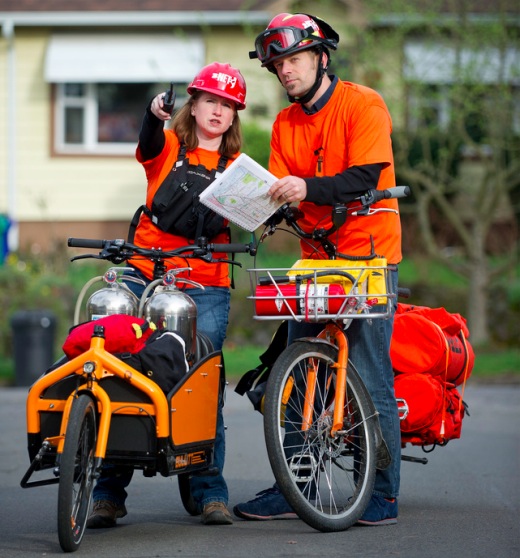
(Photos in this story were taken by Ethan Jewett for the new Neighborhood Emergency Team brochure.)
From the citizen-led Neighborhood Emergency Teams (NET), to an embrace of bikes as disaster response vehicles by City of Portland officials, there’s a growing effort in Portland to ensure that bikes play a key role in the response effort when a major earthquake or other disaster strikes. There’s even a cargo bike/disaster-themed Pedalpalooza ride in the works.
“We see cargo bikes… playing critical roles in the event our transportation system is compromised from a large scale earthquake.”
— Carmen Merlo, Director, City of Portland Bureau of Emergency Management
Why all the interest in connecting cargo bikes to disaster response? As The Portland Mercury pointed out in fantastic detail recently, after the Big One hits, “In the coming weeks, bikes will be the best way to get around.” Add in crazy global weather patterns and the threat of a tsunami (made much more real after what happened in Japan last year), and you can see the urgency. The rest of it is simply playing to Portland’s strengths. More people ride bikes in this town than any other big city in America and I’d bet we have the highest rate of cargo bike ownership in the nation.
Ethan Jewett is an active member of the Woodlawn NET. He’s one of the most prepared people I have ever met (the joke at our house is that when disaster strikes, we’re grabbing our roll cart of supplies and walking over to the Jewett house). He’s also a father (of one) and husband who sold a family car over three years ago and bought a bakfiets cargo bike (he now owns a Larry vs Harry Bullitt).
He’s been following the City of Portland Bureau of Emergency Management’s (PBEM) disaster plans closely. “In a disaster,” he told me on the phone yesterday, “a city’s resiliency is put to the test.” Jewett has read Portland’s official disaster plans and he says they include some “ominous tidbits.”
“They talk about the damage to the Interstate Highway and rail infrastructure, they talk about fuel rationing for critical services. That means there will not be fuel for everyone’s vehicles.” The way Jewett sees it, when fuel starts being rationed, Portland’s bikey-ness will shine.
“I look at Portland as having a unique opportunity in terms of preparedness. Without any planning at all, if something happened tomorrow, we’d be better off than many other cities because lots of Portlanders can get around without an automobile… If it takes 3-4 weeks to get adequate fuel supply, that wouldn’t even have an impact on my household.”
“Without any planning at all, if something happened tomorrow, we’d be better off than many other cities because lots of Portlanders can get around without an automobile.”
— Ethan Jewett, Woodlawn Neighborhood Emergency Team member
Jewett is taking his knowledge of preparedness and passion for cargo bikes straight to the City of Portland. Through the City’s NET program, Jewett has earned the ear of PBEM Director Carmen Merlo.
Reached yesterday, Merlo said her agency takes bike seriously.
“We see cargo bikes, as well as motorcycles and scooters, playing critical roles in the event our transportation system is compromised from a large scale earthquake. Whereas widespread damage or debris may make roads impassable for cars or emergency vehicles — bikes and motorcycles may still get around. We hope to tap into this network for assistance delivering food, fuel, tools, water, medical supplies, other emergency supplies, etc.”
(Merlo mentions motorcycles and scooters; but I’d point out that not only do they require fuel, they can’t carry as much and they are not as light, nimble, or efficient as bicycles.)
Merlo also said that bicycles will be specifically called out in the Portland Plan, a comprehensive planning document nearing adoption by City Council. In the neighborhood emergency response section of that plan, Merlo says, “We will focus on identifying locations of bicycle stores and repair shops to accommodate alternate transportation modes.”
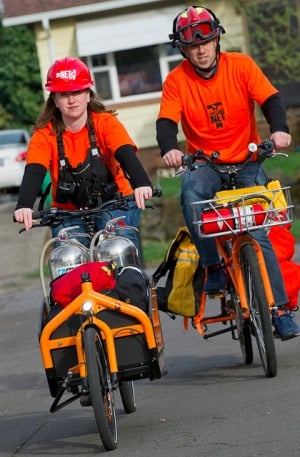
Speaking of accomodating all transportation modes. TriMet is working on a new bridge over the Willamette River. When completed it will not only be Portland’s most seismically sound span, it is also being built with only bike, foot, and rail traffic in mind.
Beyond empowering citizens to remain mobile during a crisis, bikes will also play a direct role in the response. As a NET team member, Jewett was struck by how much gear and aid supplies they are responsible for. “We’re required to carry quite a bit of stuff on foot around our neighborhood. I’m keenly aware that a cargo bike is a much bigger platform, they can carry 3-4 times more stuff and I can leave it stationary without it on my back.”
As we’ve covered several times in the past, the appeal of cargo bikes goes way beyond utility. There’s a growing crop of local enthusiasts that simply love them. In a perfect mix of passion and pragmatism, a few Portlanders have come together to plan the Disaster Relief Trials — a cargo bike trial race that will happen in June during Pedalpalooza (stay tuned for more details).
Jewett stands in the middle of all these inter-related cargo bike currents: Helping organize the Pedalpalooza ride (which he was “stunned” to see organized completely independently of his own cargo bike efforts), bending the ear of the City, and pushing for bikes to play a larger role on his NET team.
“It’s a fascinating tableau,” he said, “If we had an earthquake right now, suddenly all the people in my neighborhood that have food gardens and cargo bikes would be pretty critical pieces of infrastructure.”
Our cargo bike revolution has rolled smack dab into the reality of a major disaster; and it makes the thought of how we’ll fare afterwards a tiny bit more bearable.



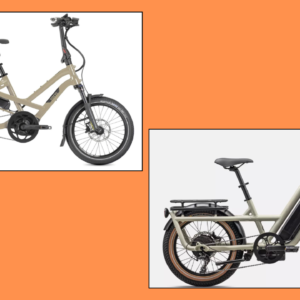
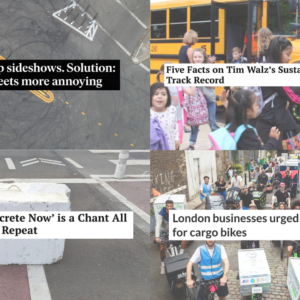
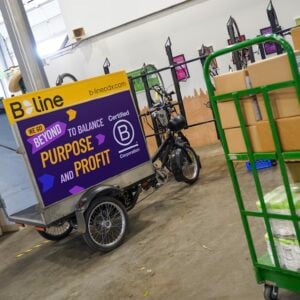

Thanks for reading.
BikePortland has served this community with independent community journalism since 2005. We rely on subscriptions from readers like you to survive. Your financial support is vital in keeping this valuable resource alive and well.
Please subscribe today to strengthen and expand our work.
“It’s a fascinating tableau,” he said, “If we had an earthquake right now, suddenly all the people in my neighborhood that have food gardens and cargo bikes would be pretty critical pieces of infrastructure.”
There really are a good number of food gardens and cargo bikes in our neighborhood right now. Go Woodlawn! Thanks for the write up, Jonathan, and thanks for the good work, Ethan.
Great stuff. What better way to show that bikes are more than toys than to have them help people at a very desperate time.
When were bikes ever toys? Uncolonize your car-dependent mind.
Good to hear this Portland.
Vancouver’s PD and Fire Depts have had very good experience with bicycle based response for our large car free events, like the annual 4th of July party. I think they have been doing this since 1998ish.
Pretty awesome. Nice to see acknowledgement of what is really a no-brainer: Conventional motorized transport is a highly complex system and therefore a fragile one. Wide, smooth, passable paved roads for example, are quite an achievement, and not at all a given.
My dad was the disaster readiness executive for a big telecommunications corporation in Tokyo when the Kobe quake struck in 1995. You might remember that a lot of the transportation infrastructure was demolished. He and his team took pre-packaged cases of portable cellular base stations, water, cash and other supplies and took the trains as far as they would go. He then bought a pile of bicycles for his team and they biked the remaining 20 miles or so into the disaster zone; which is no easy trick considering many roads were smashed to dust and this was before widespread GPS use. They were among the very first outside responders to arrive on the scene.
In the San Francisco Bay Area, many emergency response plans have long called for the use of bicycle messengers in anticipation of failed electronic communication and iffy transportation.
No one does the disaster preparedness thing better than the Japanese. When the drill siren sounds (at least in the office complex I was at in Shinegawa/Tokyo) the transformation of workforce to disaster management team happens with astonishing speed and efficiency. They even had folks whose job was to round up untrained foreigners and make sure we didn’t screw things up.
It’s kindof scary how unprepared Portland is.
Actually. Make that very scary.
It seems we here in America only seem to believe “bad” things happen in other countries, with strange names, far, far away.
And then there’s the longer term emergency (if you want to think of the post-cheap-fossil fuel era as an emergency) for which bicycles and the experience of relying on them will be even more suitable.
The stuff we can expect to be without in a disaster are similar to the things we will one day be without willy nilly: natural gas, gasoline, miles of smooth wide asphalt, 18-wheelers delivering citrus fruit, intact water and sewer infrastructure, etc. As such some of us feel that planning for a disaster and weaning ourselves off fossil fuels are both prudent.
This post reminded me of an article I read recently. There is a couple living in NE Portland who is growing citrus in big pots, and they wheel them into the greenhouse set up for the winter. They will have the only citrus in Portland someday – will be able to trade them for whatever they need.
One of my favorite things about linking disaster preparedness with sustainable practices like bicycling is the “blowback” if we never face a citywide crisis in our lifetimes . . . we get to live in an even better place. 3 days of stuff in a box is a great first step, but it does not pay dividends like planting a vegetable garden, canning, and riding your bike.
A great example of this connectivity I often think about is tool libraries. What if all tool libraries had cargo trailers (dare I dream fleets?)for area residents. They could haul compost, lumber and table saws for years and still be ready to join local NET teams for exercises and actual disaster response. That is the kind of latent strength an interconnected and intentional approach to resiliency could bring.
Thanks to Jonathan for nicely capturing this burgeoning effort. I hope to see many of you out at the Disaster Relief Trials, June 17!
Ethan,
those are excellent ideas. I have thought about them too and would love to chat offline. 9watts_atgmail
Nicely-put, Ethan
Trailer libraries are just beneath the soil! Let’s water!
Great idea, Ethan. NE Portland Tool Library has one bike trailer- but it is often checked out. It would be pretty awesome to get a longtail and a metrofeit into the tool library to help carfree folks get more of the 3000+ tools home when the trailer is checked out, or so that folks can check them out and test them when they are considering a new purchase.
I live in California and have always joked with my husband that in an “end of the world” emergency (ie. earthquake), I’m grabbing my bike. The truth is the roads will be cluttered with horrible traffic, possibly impassable, and that biking from point a to point b would make more sense and allow for more flexibility. I knew I wasn’t the first one to think of this! Love the cargo bikes in the photo, by the way.
Speaking to the “slow emergency” of peak oil,
I think the thing that is scary is that even those of us who rely on bikes for everyday transportation, and do what we can in terms of local food, are vulnerable to limited supplies of fuel for heat and clean water. People are driving around wasting energy that we may wish for some day in the future when we try to heat our houses and purify our water, let alone grow food for dense urban areas.
“even those of us who rely on bikes for everyday transportation, and do what we can in terms of local food, are vulnerable to limited supplies of fuel for heat and clean water.”
Fortunately there’s no law against wood heat, rainwater harvesting, composting toilets, etc.
As late at 1910, there was use of cycle-carried firefighting equipment in Germany, which was described earlier in Scientific American and then (with a photograph) in the New York Sun.
http://wheelbike.blogspot.com/2012/02/fire-fighting-bikes-in-germany-1910.html
triple thumb ups…
The bike shops will be the first to be looted. (And I’m not saying that to be funny.)
Looting in/after a disaster turns out to be largely a myth, and an extremely unhelpful one that serves the elites. Read Rebecca Solnit’s “A Paradise Built in Hell: The Extraordinary Communities that Arise in Disaster”
Myth?
What exactly what was happening in videos taken around Hurricane Katrina showing large numbers of people stealing from businesses?
Granted some people will work together in peace and harmony; many others believe that a post disaster is “every man for himself” and “might makes right” situation.
I really want to believe that everyone is altruistic enough to assist a random person when there is nothing to gain but our current state of partisan politics seems to prove the opposite mentality.
This is a start:
http://beprepared.sellwood.org/files/2011/04/Solnit-Unpacking-for-a-Disaster.pdf
“After both Hurricane Katrina in New Orleans and the January 2010 earthquake in Haiti, the word “looting” was used to justify shooting people down in the streets — the death penalty, that is, without benefit of trial — for what in ordinary times might otherwise be called “petty theft.” In extraordinary times, when the electricity goes, and there are no functioning bank machines, credit cards, or banks, and in many places no shopkeepers, you may need to acquire the goods that sustain life by taking them, often from wrecked or abandoned stores. The alternative is hunger, thirst, cold, and misery. To me, that’s not even theft. What we saw a lot of in Japan was people lining up to buy things in not-so-wrecked places where shopkeepers were actually still doing business.”
“The usual emphasis on “panic” in disasters implies that, in a crisis, we’re all sheep wheeling around idiotically, incapable of making good decisions, and selfishly trampling those around us. The emphasis on looting implies that, in a crisis, we’re all wolves, taking ruthless advantage of and preying on each other. Both presume that during a disaster social bonds will break. In fact, as the records of disaster after disaster show, mostly they don’t. In fact, those who study the subject (and reams of testimony by those who have lived through it) confirm that, in catastrophe, most of us behave remarkably beautifully, exhibiting presence of mind, altruism, generosity, bravery, and creativity.
Most of us.
Who, then, does it serve to imagine that we are wolves and sheep, fools and savages? Lee Clarke, a disaster sociologist and professor at Rutgers, wrote after Hurricane Katrina, “Disaster myths are not politically neutral, but rather work systematically to the advantage of elites. Elites cling to the panic myth because to acknowledge the truth of the situation would lead to very different policy prescriptions than the ones currently in vogue.” That is to say, if we are wolves and sheep, and so not to be trusted, then they are the shepherds and the wolf-killers.”
New Orleans residents taking diapers and food from unattended stores should not be considered looting. The people stealing TVs and other non-essentials are indeed looting, but even after Katrina they represent a tiny fraction of what was happening on the ground across the city. I’m sure it is more “newsworthy” to haul a news camera to Best Buy and film some thievery, but the far larger story is how people rise to the occasion and help each other . . . it is the same across the globe in rich and poorer countries alike.
The myth is not that there is “looting” during a disaster, but instead that it is as widespread as the media leads us to believe. During a normal day here in Portland the overwhelming majority of us behave appropriately–meanwhile, there are people stealing, hurting others, and behaving poorly–that DOES NOT change that the MAJORITY of people are acting appropriately. When the big one hits, I’ll be on my xtracycle looking to help out in any way I can.
Friends of ours were on their honeymoon when Gilbert struck Cozumel, spent the storm 10 floors up in their room’s bathroom with a mattress propped against the door for protection. Afterwards, no food, no nothing. So yes, they took food from stores, to eat. They also spent their time digging ditches to help drain some of the water off the island, while waiting for plane and boat service to be restored. Were they looters, or noble helpful volunteers?
“Videos” can also be extraordinarily selective. In the 1989 Loma Prieta quake only about 70 people died. There were a few bits of major damage; the Bay Bridge section that collapsed, a few flaming homes in the Marina, the elevated freeway section that collapsed in Oakland, plus some substantially damaged structures much closer to the epicenter that didn’t get much publicity. What you saw on the news was those same three things, over and over and over. My aunt lived in the Marina at the time (3rd floor), my grandmother was visiting her. Damage for her was a lot of dishes coming out of cabinets (“can you smell any gas?” “do you hear water rushing out of the pipes?” “Just wait for Susan, traffic is horrible but she’ll get there eventually, pour yourself a Scotch”). In short, you were probably misled. The “news” about this earthquake (that did not make for exciting video) was that a major earthquake struck a densely populated area, yet only about 70 people died.
Sadly, in an earthquake, I expect our bicycles will be buried in the remains of our garage, and our emergency supplies will be buried in the remains of our house. Caching the supplies in a pit in the backyard feels a little too paranoid survivalist…any other thoughts?
I think we’re generally pretty luck that 2×4 construction is so lightweight. You or your bike are unlikely to be conked on the head, though how usable that structure will be afterwards, how plumb, is another matter. As far as caching supplies outside of your house, why not? I’d prefer to feel survivalist and have access to those supplies than not. And it doesn’t need to be a hole. A Rubbermaid tub would do nicely.
I live in an old brick apartment building. Not seismically upgraded at all, of course.
My bike, and everything else in it, is likely to be destroyed in the event of a 9.1 earthquake. I definitely worry about it at times.
Shed in back yard with couple of cheap bike(S), extra tires, hand air pumps, cheap big back packs, water containers for packs, metal pots to boil water in, ax, Big locks for bikes, shovels. Tent and tarps, // These would get folk though the first week. Also Good way to get to friends or shelters.
Don’t forget a nicely stocked first aid kit. Bi-mart has great prices on first aid items, we just restocked our first aid kit a couple of weekends ago.
Which is why I am now parking my bike outside with a tarp over it at night, and planning to have the emergency supplies in a trash bin outside. I helped out after an earthquake destroyed Christchurch last year, and am determined to be of service here when it happens. I can be of little help to others if my emergency supplies and bike are buried or it is too risky to re-enter the house. Before retiring at night I make sure all my key items are in my Go Bag next to me, so I can be up and out within seconds.
OMSI had a earthquake themed Science Pub not so long ago – there may be a recording, I can’t check right now. Anywho, if you have a stickbuilt home, as 9watts says, it should be fine, assuming it’s not knocked off the foundation. To prepare against *that* you can have your house bolted to the foundation. And the presenter kept her supplies in a wheeled trashcan, and annually emptied/restocked it to keep the supplies fresh.
Ethan, I LOVE the pictures. And Jonathan and everyone else, I appreciate the discussion.
So at the speed of a loaded cargo bike, what will be the response time of the average emergency, vs an equally-equipped motorcycle or other vehicle?
I think you missed the bike-mounted firefighting equipment linked to earlier. http://wheelbike.blogspot.com/2012/02/fire-fighting-bikes-in-germany-1910.html
This is about readiness. Reliance on fossil fuel-powered machines, though clearly faster when everything’s working, are less resilient in a disaster or emergency, much less afterward. Sinking money into infrastructure that may not be usable at all is ill-advised when the bike can be counted on to be there regardless.
The Disaster Relief Trials have been designed to help answer such questions. But yes, with fuel rationing and rubble + disabled vehicle-clogged roads, regardless of ultimate speed, cargo bikes start to offer attractive possibilities, especially in this advanced era of higher-performance cargo bike and economy of scale breakthroughs allowing cargo bike access for an impressively low buy-in.
I would also like to offer a suggestion to anyone which will help tremendously in case of a very large earthquake. For anyone who runs an organisation of any size: Right now, get in contact with prior employees/volunteers who have moved out of the area, and who still know your systems. Ask them if they would be willing to return to Portland for a couple of weeks in case of a massive earthquake. While you are making sure your family is safe, and recovering from the trauma of being in a major quake, these folks can be helping to recover the organization – or moving it, as needed. They won’t be traumatized, they know your systems, they know your customers/clients/members/, they know Portland, and they will be more than happy to be of service. Plus, after an emergency, they will be ALLOWED to come in because they will have an invitation from you in advance.
what cargo bike is that in the pictures?
thanks
Larry vs Harry Bullit long john (larryvsharry.com) and Yuba Mundo longtail (yubaride.com).
Diane, GREAT idea!
William Lind (you know, that paleoconservative who hates cars and blames oil politics for our overseas adventures and vulnerability to terrorists) has proposed “Ciclovia” style events as a way to mainstream bicycle use in American cities, but to appeal to American transpo planners we call them “civil defense drills” or “emergency preparedness drills.” He writes:
“ We have had gasoline supply crises, both local and national, in the past, and we are likely to have more in the future. A supply crisis means the filling stations have no gas to sell. To prepare better for such situations, DOT could require all metropolitan areas over a certain size to develop a plan which would designate a grid of streets “Bicycles Only” during the gas shortage. Only local residents and businesses would be exempt. The grid should be dense enough to permit bicycle access to most points in the city.
Then to test the grid and make people aware of it before a crisis, the plan could be put into effect on some holidays. Think of it as a type of civil defense drill. Once people who do not normally cycle on streets do so while the plan is in effect, they may become comfortable with it. Potentially, they might press their politicians for a better urban cycling network that would always be available, not just in drills or fuel crises.“
As long as they don’t take forever to come rescue me . lol
For more information on the event, check out the event page here, http://transportland.org/2012/04/disaster-relief-trials-overview/
Surprised nobody else here was on a bicycle during an equal event. Loma Prieta quake in 1989, I had happened to ride my bike to work that day, and so had several colleagues. Quake hit, power failed, lights went out, and traffic just came to a halt. Bikes flowed through stopped cars like water.
I was at base doing my tags in a pre-06 building when that hit. Made great money that week. All the people streaming up Market St. , drinking and smoking along the way.
Any hope of extending training and advice to Salem? Cargos are FINALLY catching on here. I’m in, along with “Big Mama”, my Xtracycle 🙂
I am a 64 yo man. But I ride my bike everyday, 60-80miles a week! Let me know where to sign up to be a bike rescue and where I train for it! Let me know please. Sincerely Dan R. Newman
See this July 3 article for more info, or go to http://disasterrelieftrials.com/ . (The “sign-up online” goo.gl redirect URL in that July 3 article isn’t working.)